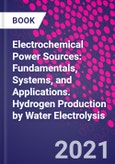Electrochemical Power Sources: Fundamentals, Systems, and Applications: Hydrogen Production by Water Electrolysis offers a comprehensive overview about different hydrogen production technologies, including their technical features, development stage, recent advances, and technical and economic issues of system integration. Allied processes such as regenerative fuel cells and sea water electrolysis are also covered. For many years hydrogen production by water electrolysis was of minor importance, but research and development in the field has increased significantly in recent years, and a comprehensive overview is missing. This book bridges this gap and provides a general reference to the topic.
Hydrogen production by water electrolysis is the main technology to integrate high shares of electricity from renewable energy sources and balance out the supply and demand match in the energy system. Different electrochemical approaches exist to produce hydrogen from RES (Renewable Energy Sources).
Please Note: This is an On Demand product, delivery may take up to 11 working days after payment has been received.
Table of Contents
1. The importance of water electrolysis for our future energy system2. Basics of water electrolysis
3. Comparison with other hydrogen production processes
4. Historical outline of water electrolysis
5. Alkaline water electrolysis (AWE)
6. PEM water electrolysis (PEMWE)
7. High-temperature steam electrolysis (SOSE)
8. Chlor-alkali electrolysis
9. Seawater electrolysis
10. Economics of water electrolysis
11. Regenerative FCs
12. Selected projects for system integration
13. Hydrogen storage
Authors
Tom Smolinka Head of Department for Chemical Energy Storage, Fraunhofer Institute for Solar Energy Systems ISE, Freiburg, Germany. Tom Smolinka is the Head of Department for "Chemical Energy Storage� at the Fraunhofer-Institute for Solar Energy Systems ISE in Freiburg, Germany. Since 2000, he has been working in the field of hydrogen technologies (fuel cells, electrolysis, solar hydrogen production and redox flow batteries). J�rgen Garche Senior Professor, Ulm University, Ulm, Germany.J�rgen Garche, graduated in chemistry at the Dresden University of Technology (DTU) in Germany in 1967. He was awarded his PhD in theoretical electrochemistry in 1970 and his habilitation in applied electrochemistry in 1980 from the same university. He worked at the DTU in the Electrochemical Power Sources Group for many years in different projects, mainly related to conventional batteries, before he moved 1991 to the Centre for Solar Energy and Hydrogen Research (ZSW) in Ulm, where he was, until 2004, the Head of the Electrochemical Energy Storage and Energy Conversion Division.
He was Professor of Electrochemistry at Ulm University and Guest Professor at Shandong University - China, 2005, Sapienca University Roma - Italy, 2009, 2013, 2016, and 2023, TUM-CREATE - Singapore, 2014, 2015, 2016- 2016, Dalian Institute of Chemical Physics - China, 2016, CNR Institute for Advanced Energy Technologies, Messina - Italy, 2019. After he retired from the ZSW he founded in 2004 the consulting firm Fuel Cell and Battery Consulting (FCBAT). Since 2015 he is senior professor at Ulm University. He has published more than 300 papers, 10 patents, and 11 books, among others as editor-in-chief of the first edition of Encyclopedia of Electrochemical Power Sources. He is listed in "World's most Influential Scientific Minds� by Thomas Reuters (2014) and in the book "Profiles of 93 Influential Electrochemists� (2015).








